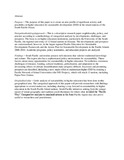| dc.description.abstract | Purpose – The purpose of this paper is to create an area profile of significant activity and possibility in higher education for sustainable development (ESD) in the island nations of the South Pacific Ocean.
Design/methodology/approach – This is a descriptive research paper on philosophy, policy, and practice according to a methodology of categorical analysis by developments, challenges, and prospects. The focus is on higher education institutions, particularly the University of the South Pacific, the regional university of 12 Island nations in Oceania. The developments and prospects are contextualized, however, in the larger regional Pacific Education for Sustainable Development Framework and the Action Plan for Sustainable Development in the Pacific Islands 2008-2014. Academic programs, policy statements, and education projects are analyzed.
Findings – South Pacific universities possess rich missions that valorize traditional knowledge and culture. The region also has a sophisticated policy environment for sustainability. These factors create many opportunities for sustainability in higher education. Nevertheless, enormous challenges of distance, funding, cultural traditions, globalisation, and adaptation to the devastating effects of climate destabilisation make progress difficult. Successes and promising prospects are described, including a new major effort to mainstream higher ESD by creating a Pacific Network of Island Universities (the NIU Project), which will reach 13 nations, including Papua New Guinea.
Originality/value – Little analysis of sustainability in higher education has been done in this geographical area. The categorical approach of this paper will provide researchers with findings appropriate to several endeavors, including charting a way forward in sustainability in higher education in the South Pacific Island nations. South Pacific initiatives arising from the unique nature of island geography and tradition could illuminate for others what is called the “Pacific Way.” Comparative analysis to mainland nations in the Asia-Pacific region may also prove useful to researchers and practitioners. | en |

